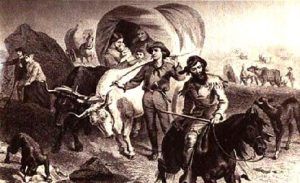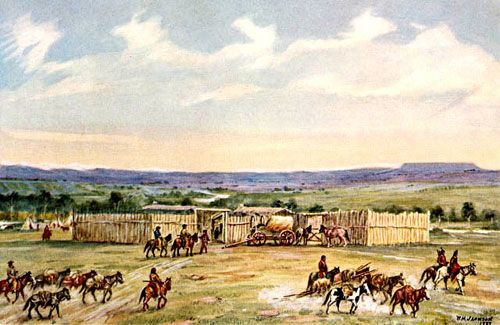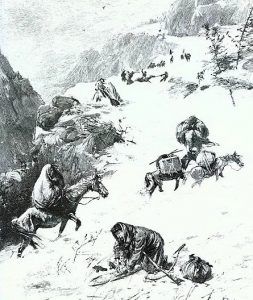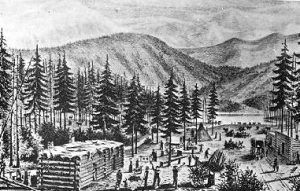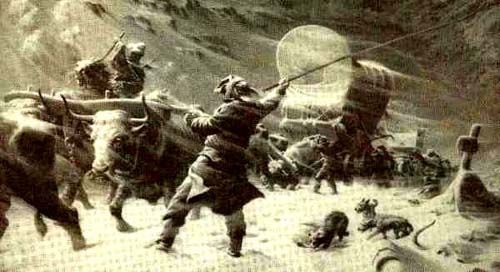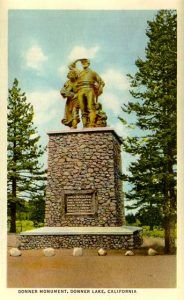Among the most authentic histories of these bands of early pioneers which undertook to make the passage of this region thirty years since, when it involved such difficulties and dangers, is the following:
In 1846, soon after the commencement of the Mexican-American War, a party of emigrants undertook to cross the Continent to settle on the Pacific coast. The party consisted of J. F. Reed, wife, and four children; Jacob Donner, wife, and seven children; William Pike, wife, and two children; William Foster, wife, and one child; Lewis Kiesburg; wife, and one child; Mrs. Murphy, a widow, and five children; William McCutcheon, wife, and one child; W. H. Eddy, wife, and two children; W. Graves, wife, and eight children; Jay Fosdicks, and his wife; John Denton, Noah James, Patrick Dolan, Samuel Shoemaker, C. F. Stanton, Milton Elliot, James Smith, Joseph Rianhard, Augustus Spized, John Baptiste, Antoine, Walter Herring, Luke Hallerin, Charles Burger, and Baylie Williams, making a total of sixty-five souls, of whom ten were women, and thirty-one were children.
Having supplied themselves with wagons, horses, cattle, provisions, arms, ammunition, and other articles requisite for their enterprise, they set out on their journey from the Mississippi, and, after a toilsome march of many weeks across the prairies, they reached, late in the summer of that year, the foot-hills of the Rocky Mountains. Resting for a few days in a grassy valley, and, gazing with wistful eyes on the mighty peaks which towered beyond them, they girded up their loins for the novel toils and perils they were soon to encounter, and pushed on, expecting to follow the great military route which would conduct them, before the winter snows, to the sunny slopes which are fanned by the breezes of the peaceful ocean.
They reached the Sweetwater River, on the eastern side of the mountains, late in August. While in camp there, they were induced, by the representations of one Lansford W. Hastings, to take a new route to the Pacific coast. Relying on the truth of these statements, and full of hope that they would thus shorten their journey, they left the beaten track and started onward through an unknown region. Long before they had reached the valley of the Great Salt Lake, they began to encounter the greatest difficulties. At one time they found themselves in a dense forest, and, seeing no outlet or passage, were forced to cut their way through, making only 40 miles of progress in 30 days.
In September, they were passing through the Utah Valley, since occupied by the Mormons. Here death invaded their ranks and removed Mr. Hallerin. This and an accident to one of the wagons detained them for two days.
Pursuing their march, they were next forced to travel across a desert tract without grass or water and lost many cattle.
At this point in the journey, the gloomiest forebodings seized the stoutest heart. They were in a rugged and desolate region, far from all hope of succor, surrounded by hostile Indians, their cattle dying, and their stock of provisions lessening rapidly, with the sad conviction hourly forcing itself upon their minds, that they had been betrayed by one of their own countrymen.
Some of the families had already been completely ruined by the loss of their cattle and by being forced to abandon their goods and property. They were in complete darkness as to the character of the road before them. To retreat across the desert to Bridger, was impossible. There was no way left to them but to advance, and this they now regarded as perilous in the extreme.
The cattle that survived were exhausted and broken down, but to remain there was to die. Some of the men, broken by their toils and sufferings, lay down and declared they might as well die there as further on; others cursed the deception of which they had been the victims; others uttered silent prayers, and then sought to raise the drooping spirits of their comrades, and encourage them to press forward. Of these last were the females of the party–wives, who never faltered in these hours of trial, but sustained their husbands in their dark moods; and mothers, who fought the dreadful battle, thinking more of their children than of themselves.
Once more the party resumed their journey, but only to meet fresh disasters. “Thirty-six head of working cattle were lost, and the oxen that survived were greatly injured. One of Mr. Reed’s wagons was brought to camp; and two, with all they contained, were buried in the plain. George Donner lost one wagon. Kiesburg also lost a wagon. The atmosphere was so dry upon the plain, that the woodwork of all the wagons shrank to a degree that made it next to impossible to get any of them through.
“Having yoked some loose cows, as a team for Mr. Reed, they broke up their camp, on the morning of September 16th, and resumed their toilsome journey, with feelings which can be appreciated by those only who have traveled the road under somewhat similar circumstances. On this day they traveled six miles, encountering a very severe snowstorm. About three o’clock in the afternoon, they met Milton Elliot and William Graves, returning from a fruitless effort to find some cattle that had strayed away. They informed them that they were in the immediate vicinity of a spring.”
This spring they succeeded in reaching, and there they encamped for the night. At the early dawn, on September 17th, they resumed their journey, and, at four o’clock A. M. of the 18th, they arrived at water and grass, some of their cattle having meanwhile perished, and the teams which survived being in a very enfeebled condition. Here the most of the little property which Mr. Reed still had was burned, or cached, together with that of others. Mr. Eddy now proposed putting his team on Mr. Reed’s wagon and letting Mr. Pike have his wagon so that the three families could be taken on. This was done. They remained in camp during the day of the 8th, to complete these arrangements, and to recruit their exhausted cattle.
The journey was continued, with scarcely any interruption or accident, until the first of October, when some Indians stole a yoke of oxen from Mr. Graves. Other thefts followed, and it became evident that the party would suffer severely from the hostility of the Indians.
A large number of cattle were stolen or shot by the merciless marauders. The women were kept in a perpetual state of alarm by the proximity of the savages. Maternal love and anxiety for those thirty-one innocent children now exposed to captivity and death at the hands of the prowling redskins, made the lives of those unfortunate matrons one long, sad vigil. They could meet death locked in the fastnesses of the mountains, or in the desolate plain; they could even lay the remains of those dear to them, far from home, in the darkest cañon of those terrible mountains, but the thought of seeing their children torn from their embrace and borne into barbarous captivity, was too much for their woman’s natures. The camp was the scene of tears and mourning from an apprehension more dreadful even than real sufferings.
The fear of starvation, also, at this stage in their journey, began to be felt. An account was taken of their stock of provisions, and it was found that they would last only a few weeks longer and that only by putting the party on allowances.
Here, again, the self-sacrificing spirit that woman always shows in hours of trial shone out with surpassing brightness. Often did those devoted wives and mothers take from their own scanty portion to satisfy the cravings of their husbands and children.
For some weeks after the 19th of October, 1846, the forlorn band moved slowly on their course through those terrible mountains. Sometimes climbing steeps which the foot of white man had never before scaled, sometimes descending yawning cañons, where a single misstep would have plunged them into the abyss hundreds of feet below. The winter fairly commenced in October. The snow was piled up by the winds into drifts in some places forty feet deep, through which they had to burrow or dig their way. A sudden rise in the temperature converted the snow into slush and forced them to wade waist-deep through it or lie drenched to the skin in their wretched camp.
One by one their cattle had given out, and their only supply of meat was from the chance game which crossed their track. At last, their entire stock of provisions was exhausted, and they stood face to face with the grim specter of starvation. They had now encamped in the mountains, burrowing in the deep snow, or building rude cabins, which poorly sufficed to ward off the biting blast, and every day their condition was growing more pitiable.
On the 4th of January, 1847, Mr. Eddy, seeing that all would soon perish unless food was quickly obtained, resolved to take his gun and press forward alone. He informed the party of his purpose. They besought him not to leave them. But some of the women, recognizing the necessity of his expedition, and excited by the feeble wails of their perishing children, bade him God-speed. One of them, Mary Graves, who had shown an iron nerve and endurance all through their awful march, insisted that she would accompany him or perish. The two accordingly set forward. Mr. Eddy soon afterward had the good fortune to shoot a deer, and the couple made a hearty meal on the entrails of the animal.
The next day several of the party came up with them and feasted on the carcass of the deer. Their number during the preceding night had again been lessened by the death of Jay Fosdicks. The survivors, somewhat refreshed, returned to their camp on the following day.
The Indians Lewis and Salvadore, being threatened with death by the famished emigrants, had some days before stolen away. After the deer had been consumed, and while Mr. Eddy’s party were returning to camp, they fell upon the tracks of these fugitives; Foster, who was at times insane through his sufferings, followed the trail and overtook and killed them both. He cut the flesh from their bones and dried it for future use. Mr. Eddy and a few of the party, in their wanderings, at length reached an Indian village, where their immediate sufferings were relieved.
The government of California being informed of the imminent peril of the emigrants in the mountain camp took measures to send out relief, and a number of inhabitants contributed articles of clothing and provisions. Two expeditions, however, failed to cross the mountains in consequence of the depth of the snow. At length, a party of seven men, headed by Aquilla Glover, and accompanied by Mr. Eddy, who, though weak, insisted on returning to ascertain the fate of his beloved wife and children, succeeded in crossing the mountains and reaching the camp.
The last rays of the setting sun were fading from the mountain-tops as the succoring party arrived at the camp of the wanderers. All was silent as the grave. The wasted forms of some of the wretched sufferers were reposing on beds of snow outside the miserable shelters which they had heaped up to protect them from the bitter nights.
When they heard the shouts of the newcomers, they feebly rose to a sitting posture and glared wildly at them. Women with faces that looked like death’s heads were clasping to their hollow bosoms children which had wasted to skeletons.
Slowly the perception of the purpose for which their visitors had come, dawned upon their weakened intellects; they smiled, they gibbered, they stretched out their bony arms and hurrahed in hollow tones. Some began to stamp and rave, invoking the bitterest curses upon the mountains, the snow, and on the name of Lansford W. Hastings; others wept and bewailed their sad fate; the women alone showed firmness and self-possession; they fell down and prayed, thanking God for delivering them from a terrible fate, and imploring His blessing upon those who had come to their relief.
Upon going down into the cabins of this mountain camp, the party was presented with sights of woe and scenes of horror, the full tale of which never will and never should be told; sights which, although the emigrants had not yet commenced eating the dead, were so revolting that they were compelled to withdraw and make a fire where they would not be under the necessity of looking upon the painful spectacle.
Fourteen, nearly all men, had actually perished of hunger and cold. The remnant was in a condition beyond the power of language to describe, or even of the imagination to conceive. A spectacle more appalling was never presented in the annals of human suffering. For weeks many of the sufferers had been living on bullocks’ hides, and even more loathsome food, and some, in the agonies of hunger, were about to dig up the bodies of their dead companions for the purpose of prolonging their own wretched existence.
The females showed that fertility of resources for which women is so remarkable in trying crises. Mrs. Reed, who lived in Brinn’s snow-cabin, had, during a considerable length of time, supported herself and four children by cracking and boiling again the bones from which Brinn’s family had carefully scraped all the meat. These bones she had often taken and boiled again and again for the purpose of extracting the least remaining portion of nutriment. Mrs. Eddy and all but one of her children had perished.
The condition of the unfortunates drew tears from the eyes of their preservers. Their outward appearance was less painful and revolting, even than the change which had taken place in their minds and moral natures.
Many of them had in a great measure lost all self-respect. Untold sufferings had broken their spirits and prostrated everything like an honorable and commendable pride. Misfortune had dried up the fountains of the heart; and the dead, whom their weakness had made it impossible to carry out, were dragged from their cabins by means of ropes, with apathy that afforded a faint indication of the change which a few weeks of dire suffering had produced in hearts that once sympathized with the distressed and mourned the departed.
With many of them, all principles, too, had been swept away by this tremendous torrent of accumulated and accumulating calamities.
It became necessary to place a guard over the little store of provisions brought to their relief, and they stole and devoured the rawhide strings from the snow-shoes of those who had come to deliver them. But some there were whom no temptation could seduce, no suffering move; who were ‘Among the faithless faithful still.’
The brightest examples of these faithful few were to be found among the devoted women of that doomed band. In the midst of those terrible scenes when they seemed abandoned by God and man, the highest traits of the female character were constantly displayed. The true-hearted, affectionate wife, the loving, tender mother, and the angel of mercy to her distressed comrades–in all these relations her woman’s heart never failed her.
On the morning of February 20th John Rhodes, Daniel Tucker, and R.S. Mootrey, three of the party, went to the camp of George Donner eight miles distant, taking with them a little beef. These sufferers were found with but one hide remaining. They had determined that, upon consuming this, they would dig up from the snow the bodies of those who had died from starvation. Mr. Donner was helpless. Mrs.Donner was weak, but in good health, and might have come into the settlements with Mr. Glover’s party, yet she solemnly but calmly declared her determination to remain with her husband, and perform for him the last sad offices of affection and humanity. And this she did in full view of the fact that she must necessarily perish by remaining behind.
The rescuing party, after consultation, decided that their best course would be to carry the women and children across the mountains, and then return for the remnant of the sufferers. Accordingly, leaving in the mountain camp all the provisions that they could spare, they commenced their return to the settlement with twenty-three persons, principally women and children, from whom, with kind thoughtfulness, they concealed the horrible story of the journey of Messrs. Eddy and Foster.
A child of Mrs. Pike, and one of Mrs. Kiesburg, were carried in the arms of two of the party. Hardly had they marched two miles through the snow when two of Mrs. Reed’s children became exhausted–one of them a girl of eight, the other a little boy of four.
There were but two alternatives: either to return with them to the mountain-camp, or abandon them to death. When the mother was informed that it would be necessary to take them back, a scene of the most thrilling and painful interest ensued. She was a wife, and her affection for her husband, who was then in the settlement, dictated that she should go on; but she was also a mother, and all-powerful maternal love asserted its sway, and she determined to send forward the two children who could walk, and return herself with the two youngest, and die with them.
No argument or persuasion on the part of Mr. Glover could shake her resolution. At last, in response to his solemn promises that, after reaching Bear River, he would return to the mountain camp and bring back her children, after standing in silence for some moments, she turned from her darling babes and asked Mr. Eddy, “Are you a mason?” A reply being given in the affirmative, she said, “will you promise me, upon the word of a mason, that when you arrive at Bear River Valley, you will return and bring back my children if we do not meantime meet their father going for them?” “I do thus promise,” Mr. Glover replied. “Then I will go on,” said the mother, weeping bitterly as she pronounced the words. Patty, the little girl, then took her mother by the hand and said, “Well, mamma, kiss me goodbye! I shall never see you again. I am willing to go back to our mountain camp and die, but I cannot consent to your going back. I shall die willingly if I can believe that you will see papa. Tell him goodbye for his poor little Patty.”
The mother and the children lingered in a long embrace. As Patty turned from her mother to go back to the camp, she whispered to Mr. Glover and Mr. Mootrey, who were to take her, that she was willing to go back and take care of her little brother, but that she should never see her mother again.
Before reaching the settlement Mrs. Reed met her husband, who had been driven, for some cause, from the party several weeks before, and had succeeded in crossing the mountains in safety.
Messrs. Reed and McCutchen next headed a relief party and crossed the mountains with supplies for the remainder of the emigrants. The Reed children were alive but terribly wasted from their dreadful sufferings.
Hunger had driven the emigrants to revolting extremities. In some of the cabins were found parts of human bodies trussed and spitted for roasting, and traces of these horrid feasts were seen about the space in front of the doors where offal was thrown.
The persons taken under Mr. Reed’s guidance on the return were Patrick Brinn, wife and five children; Mrs. Graves, and four children; Mary and Isaac Donner, children of Jacob Donner; Solomon Work, a stepson of Jacob Donner, and two of his children. They reached the foot of the mountain without much difficulty, but they ascertained that their provisions would not last them more than a day and a half. Mr. Reed then sent three men forward with instructions to get supplies at a cache about 15 miles from the camp. The party resumed its journey, crossed the Sierra Nevada, and after traveling about ten miles, encamped on a bleak point, on the north side of a little valley, near the head of the Yuba River. A storm set in and continued for two days and three nights. On the morning of the third day, the clouds broke away and the weather became more intensely cold than it had been during the journey. The sufferings of the emigrants in their bleak camp were too dreadful to be described. There was the greatest difficulty in keeping up the fire, and during the night the women and children, who had on very thin clothing, were in great danger of freezing to death; when the storm passed away, the whole party were very weak, having passed two days without food. Leaving Patrick Brinn and his family and the rest of the party who were disabled, Mr. Reed, and his California friends, his two children, Solomon Hook and a Mr. Miller, pressed forward for supplies, and in five days they succeeded in reaching the settlement.
It was some weeks before a new relief party organized by Messrs. Eddy and Foster were successful in reaching the party which Reed had left. A shocking spectacle was presented to the eyes of the adventurers at the “Starved Camp” as they rightly named it. Patrick Brinn and his wife were sunning themselves with a look of vacuity upon their faces. They had eaten the two children of Jacob Donner: Mrs. Graves’ body was lying near them with almost all the flesh cut from the arms and limbs. Her breasts, heart, and liver were then being boiled over the fire. Her child sat by the side of the mangled remains crying bitterly.
After being supplied with food they were left in charge of three men who undertook to conduct them to the settlement. Meanwhile Messrs. Eddy and Foster went on to the horrible mountain camp only to be shocked and revolted by new scenes of horror. Strewed about the cabins and burrows, in the snow, were the fragments of human bodies from which the flesh had been stripped; among the debris of the hideous feasts sat the emaciated survivors looking more like cannibal-demons than human beings. Kiesburg had dug up the corpse of one of Mr. Eddy’s children and devoured it, even when other food could be obtained, and the infuriated father could with difficulty be restrained from killing the monster on the spot. Of the five surviving children at the mountain camp, three were those of Mr. and Mrs. Jacob Donner. When the time came for the party of unfortunates to start for the settlement under the guidance of their generous protectors, Mr. Donner’s condition was so feeble that he was unable to accompany them, and though Mrs. Donner was capable of traveling, she utterly refused to leave her husband while he survived. In response to the solicitations of those who urged that her husband could live but a little longer, and that her presence would not add one moment to the remaining span of his life, she expressed her solemn and unalterable purpose which no hardship or danger could change, to remain and perform for him the last sad offices of duty and affection. At the same time, she manifested the most profound solicitude for her beloved children and implored Mr. Eddy to save them, promising all that she possessed if he would convey them in safety to the settlement. He pledged himself to carry out her wishes without recompense, or perish in the attempt.
No provisions remained to supply the needs of these unhappy beings. At the end of two hours, Mr. Eddy informed Mrs. Donner that a terrible necessity constrained him to depart. It was certain that Jacob Donner would never rise from the wretched couch on which he lay, worn out with toil and wasted by famine. It was almost equally certain that unless Mrs. Donner then abandoned her unfortunate partner and accompanied Mr. Eddy and his party to the settlement, she would die of wasting famine or perish violently at the hands of some lurking cannibal. By accompanying her children she could minister to their wants and perhaps be the means of saving their lives. The all-powerful maternal instinct combined with the love of life urged her to fly with her children from the scene of so many horrors and dangers. Well might her reason have questioned her, “Why stay and meet inevitable death since you cannot save your husband from the grave which yawns to receive him? and when your presence, your converse and hands can only beguile the few remaining hours of his existence?” Time passed. By no entreaties could she enlarge the hour of departure which had now arrived. Nor did she seek to and thus endanger the lives of those who were hastening to depart. She must decide the dread question at that moment.
Rarely in the long-suffering record of woman, has she been placed in circumstances of such peculiar trial, but the love of life, the instinct of self-preservation, and even maternal affection could not triumph over her affection as a wife. Her husband begged her to save her life and leave him to die alone, assuring her that she could be of no service to him, as he could not probably survive under any circumstances until the next morning; with streaming eyes, she bent over him, kissed his pale, emaciated, haggard, and even then, death-stricken cheek, and said:
“No! no! dear husband, I will remain with you, and here perish rather than leave you to die alone, with no one to soothe your dying sorrows, and close your eyes when dead. Entreat me not to leave you. Life, accompanied with the reflection that I had thus left you, would possess for me more than the bitterness of death; and death would be sweet with the thought in my last moments, that I had assuaged one pang of yours in your passage into eternity No! no! no!” She repeated, sobbing convulsively.
The parting interview between the parents and the children is represented to have been one that can never be forgotten as long as reason remains or the memory performs its functions. In the dying father the fountain of tears was dried up; but the agony on his death-stricken face and the feeble pressure of his hand on the brow of each little one as it bade him adieu forever, told the story of his last great sorrow. As Mrs. Donner clasped her children to her heart in a parting embrace, she turned to Mr. Eddy with streaming eyes and sobbed her last words, “O, save, save, my children!”
This closing scene in the sad and eventful careers of those unfortunate emigrants was the crowning act in a long and terrible drama which illustrated, under many conditions of toil, hardship, danger, despair, and death, the courage, fortitude, patience, love, and devotion of woman.
William Worthington Fowler, 1877. Compiled and edited by Kathy Alexander/Legends of America, updated December 2021.
About the Author: William Worthington Fowler originally published in 1877, a book entitled Woman On The American Frontier: A Valuable And Authentic History.
Also See:
Historical Accounts of American History

